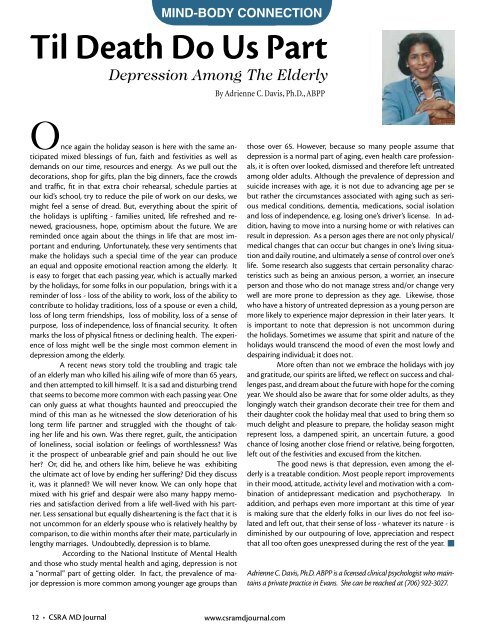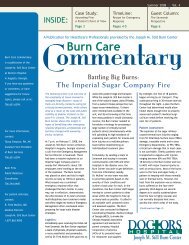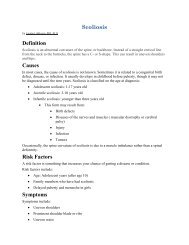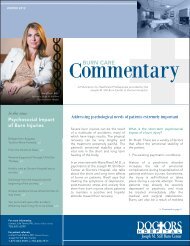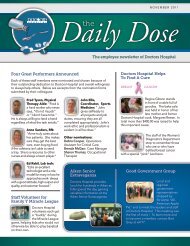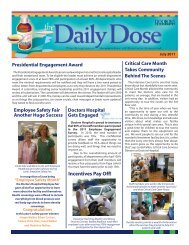CSRA MD Journal - Doctors Hospital
CSRA MD Journal - Doctors Hospital
CSRA MD Journal - Doctors Hospital
Create successful ePaper yourself
Turn your PDF publications into a flip-book with our unique Google optimized e-Paper software.
MIND-BODY CONNECTIONTil Death Do Us PartDepression Among The ElderlyBy Adrienne C. Davis, Ph.D., ABPPOnce again the holiday season is here with the same anticipatedmixed blessings of fun, faith and festivities as well asdemands on our time, resources and energy. As we pull out thedecorations, shop for gifts, plan the big dinners, face the crowdsand traffic, fit in that extra choir rehearsal, schedule parties atour kid’s school, try to reduce the pile of work on our desks, wemight feel a sense of dread. But, everything about the spirit ofthe holidays is uplifting - families united, life refreshed and renewed,graciousness, hope, optimism about the future. We arereminded once again about the things in life that are most importantand enduring. Unfortunately, these very sentiments thatmake the holidays such a special time of the year can producean equal and opposite emotional reaction among the elderly. Itis easy to forget that each passing year, which is actually markedby the holidays, for some folks in our population, brings with it areminder of loss - loss of the ability to work, loss of the ability tocontribute to holiday traditions, loss of a spouse or even a child,loss of long term friendships, loss of mobility, loss of a sense ofpurpose, loss of independence, loss of financial security. It oftenmarks the loss of physical fitness or declining health. The experienceof loss might well be the single most common element indepression among the elderly.A recent news story told the troubling and tragic taleof an elderly man who killed his ailing wife of more than 65 years,and then attempted to kill himself. It is a sad and disturbing trendthat seems to become more common with each passing year. Onecan only guess at what thoughts haunted and preoccupied themind of this man as he witnessed the slow deterioration of hislong term life partner and struggled with the thought of takingher life and his own. Was there regret, guilt, the anticipationof loneliness, social isolation or feelings of worthlessness? Wasit the prospect of unbearable grief and pain should he out liveher? Or, did he, and others like him, believe he was exhibitingthe ultimate act of love by ending her suffering? Did they discussit, was it planned? We will never know. We can only hope thatmixed with his grief and despair were also many happy memoriesand satisfaction derived from a life well-lived with his partner.Less sensational but equally disheartening is the fact that it isnot uncommon for an elderly spouse who is relatively healthy bycomparison, to die within months after their mate, particularly inlengthy marriages. Undoubtedly, depression is to blame.According to the National Institute of Mental Healthand those who study mental health and aging, depression is nota “normal” part of getting older. In fact, the prevalence of majordepression is more common among younger age groups thanthose over 65. However, because so many people assume thatdepression is a normal part of aging, even health care professionals,it is often over looked, dismissed and therefore left untreatedamong older adults. Although the prevalence of depression andsuicide increases with age, it is not due to advancing age per sebut rather the circumstances associated with aging such as seriousmedical conditions, dementia, medications, social isolationand loss of independence, e.g. losing one’s driver’s license. In addition,having to move into a nursing home or with relatives canresult in depression. As a person ages there are not only physical/medical changes that can occur but changes in one’s living situationand daily routine, and ultimately a sense of control over one’slife. Some research also suggests that certain personality characteristicssuch as being an anxious person, a worrier, an insecureperson and those who do not manage stress and/or change verywell are more prone to depression as they age. Likewise, thosewho have a history of untreated depression as a young person aremore likely to experience major depression in their later years. Itis important to note that depression is not uncommon duringthe holidays. Sometimes we assume that spirit and nature of theholidays would transcend the mood of even the most lowly anddespairing individual; it does not.More often than not we embrace the holidays with joyand gratitude, our spirits are lifted, we reflect on success and challengespast, and dream about the future with hope for the comingyear. We should also be aware that for some older adults, as theylongingly watch their grandson decorate their tree for them andtheir daughter cook the holiday meal that used to bring them somuch delight and pleasure to prepare, the holiday season mightrepresent loss, a dampened spirit, an uncertain future, a goodchance of losing another close friend or relative, being forgotten,left out of the festivities and excused from the kitchen.The good news is that depression, even among the elderlyis a treatable condition. Most people report improvementsin their mood, attitude, activity level and motivation with a combinationof antidepressant medication and psychotherapy. Inaddition, and perhaps even more important at this time of yearis making sure that the elderly folks in our lives do not feel isolatedand left out, that their sense of loss - whatever its nature - isdiminished by our outpouring of love, appreciation and respectthat all too often goes unexpressed during the rest of the year.Adrienne C. Davis, Ph.D. ABPP is a licensed clinical psychologist who maintainsa private practice in Evans. She can be reached at (706) 922-3027.12 • <strong>CSRA</strong> <strong>MD</strong> <strong>Journal</strong>www.csramdjournal.com


